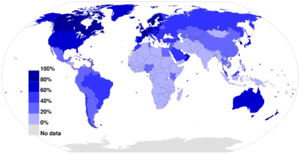
Who has internet access via a computer ? Not as many as you might think. On average there are 32,8 internet users per 100 inhabitants worlwide. The percentage of internet users is far higher in developing countries than in developing countries (in developing countries 85 to over 90% of the population have internet access), so we can assume an average that is far lower than 30% in developing countries. See Wikipedia:List_of_countries_by_number_of_Internet_users. The fact that there are so little internet users can be explained by the fact that little internet distribution points and/or points with little badwith have been made by companies. Many areas thus do not have any internet access at all (well, unless the consumer uses satellite internet, which can be received anywhere, but which is very costly).
The amount of internet users can be made higher by having the consumer (assuming he lives in an area that has access) share one internet access over different computers/users. This can be done by internet sharing via WiFi or WiMax.
In addition, people in developing countries can also use the latest smart phones to access the internet. Users that are skipping laptops in favor of smart phones are called Leapfroggers. Present-day smart phones have the ability to display (html) websites.[1][2]
Internet access: how it's achieved[edit | edit source]
Internet access is distributed by major companies from specific areas/cities. These areas/cities are generally heavily populated, so that sufficient revenue can be attained by the company sharing the internet access over its customers. Generally, the system relies on submarine cables for its major data arteries and further distributes it over the many houses in an area using land-based optical fibre cables.
Although this, in essence, allows to share the internet access to anywhere within a continent, there are actually reasons why not sharing internet over an entire continent is a good thing:
- First of all, it is an incentive for people to go live in more urbanized areas, hence reducing the environmental impact of the people themselves on the planet greatly
- Secondly, sharing internet access over a smaller area is more energy-efficient, more cost-effective, and requires less cables to be laid (which too has a small environmental impact)
Overcoming the digital divide[edit | edit source]
The digital divide is being crossed faster in developing countries than what happened in the past in the developed world. Some ways on how people overcome the fact that they don't have internet access themselves (on their computer) is
- by using internet cafes
- by transferring data obtained via the internet to other computers using storage media (ie cd-rom, flashdrive, ...)
- by transferring data obtained via the internet to other computers using wireless internet (ie WiFi, WiMax). Note that this is not internet sharing via WiFi or WiMax.
- by transferring data obtained via the internet to other computers using radio broadcasts[3]
Transferring data via removable media[edit | edit source]
Once such a system is set up, it is called a Sneakernet. Sneakernets are generally used to exchange emails, but any file type can in essence be shared. USB Flash Drives are cheap (about 3 US dollars in 2007) or available by donation.
See also[edit | edit source]
External links[edit | edit source]
- http://en.wikipedia.org/wiki/Submarine_communications_cable
- Liquid Robotics Wave Glider: a satellite internet-enabled WiFi internet access point
References[edit | edit source]
- ↑ A story was told at BarCampAfrica in Mountain View, CA, USA, 2008 regarding a conversation in Africa. "Have you heard of Google?" "Yes, of course." "Have you searched Google from a mobile phone?" "Of course - how else can you search with Google?" You only need one phone in the village with this capability to massively increase people's ability to find information.
- ↑ Smart phones outsell dumb phones in Africa already
- ↑ This is done by embedding files in music radio signals and receiving it on a radio + computer. See http://wiki.laptop.org/go/Internet